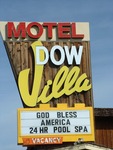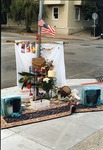 |
| Angelika/Mike Schilli |
|
San Francisco has just recently started to return to normalcy, especially in the past week. Restaurants are filling up again, and we spotted more tourists in the city. Halloween decorations (Halloween is on October 31st and is a carnival-like event) have appeared in stores, gradually replacing the sea of flags that still accompanies us at every turn. Last Monday, pedestrians and cyclists were finally allowed back on the Golden Gate Bridge, which we all love so much. Heightened security measures had restricted bridge access to only drivers for almost three weeks. As a result, a small line of people formed at the barriers last Monday, and excitement spread as the gates opened. The appearance of normalcy was, of course, deceptive. This can be seen in the Golden Gate Bridge story. Even though cycling and strolling over the city's red landmark is allowed again, it is only permitted from 7 AM to 7 PM, until nightfall. Previously, one could also enjoy the fantastic view from the bridge of the city at night.
Since the terrorist attacks on New York and Washington, we have encountered quite a few things that deviate from the norm, including various quirky ones: The sale of patriotic Halloween costumes has skyrocketed this year. The postal service is coming out with a new 34-cent stamp featuring the American flag and stating "United we stand." In tattoo shops, there is also a high demand for the American flag. M&Ms (comparable to Smarties) are soon to be available in special packaging in the colors of the American flag (red, white, blue). However, we have not yet been able to find them in supermarkets.
The sale of weapons is booming, and there has been a real rush to buy gas masks. The fear that terrorists might use poison gas runs deep and is being fueled by Attorney General Ashcroft, who seemingly will use any means necessary to push through his new anti-terrorism laws. However, up to now, we personally haven't known anyone who sits at home armed with a gas mask. The saleswoman at the cheese shop around the corner confessed to me when I was shopping there on Friday that her husband insisted they both get a gas mask. Many people also bought the antibiotic "Cipro," which is supposed to help against anthrax, as a preventive measure--at least that's what the media reported.
Otherwise, we find calls for donations at every supermarket or drugstore checkout. You can simply hand the money to the cashier, and the supermarket will forward it, usually to the American Red Cross, which has set up a relief fund for the victims of the attacks. Donations a la USA - the country has always been pragmatic.
We are somewhat confused, however, as we observe how suddenly fundamental American principles are being overridden. There was an official reprimand from the White House Press Secretary, Ari Fleischer, directed at public figures such as journalists and political talk show hosts who expressed criticism of the White House's actions. Fleischer warned that everyone should be more careful about what they say ("...the reminder is to all Americans that they need to watch what they say..."). And this in a country where freedom of speech is usually held above all else.
Critical voices are rare anyway, which can also be seen in the fact that Bush suddenly seems to have the whole country behind him and is being hailed by many as the greatest president of all. The election debacle and the first months of his term are currently being conveniently overlooked even by his sharpest critics. Even David Letterman, who is the American counterpart to Harald Schmidt and had regularly mocked Bush and Giuliani, the mayor of New York, on his "Late Show," has transformed into a red-blooded American patriot. The subsidies for the struggling airline industry and other sectors affected by the terrorist attacks can also be described as un-American, because otherwise the principle here is: the market rules the world.
We view the debate regarding the legislative changes to combat terrorism with suspicion. Particularly, Attorney General Ashcroft's proposal that legal immigrants can be detained indefinitely without any evidence during a national emergency--such as the one currently declared--if they pose any threat to the American state, simply suspends the rules of a constitutional state. Thankfully, other leading politicians also see this as a problem, and in the mediation committee, the clause "indefinite time" has now been reduced to seven days.
This debate and the comparison frequently heard in the first days, that the attack on the World Trade Center and the Pentagon is similar to the Japanese attack on Pearl Harbor in World War II, revived a silenced chapter of American history for many Americans of Japanese descent. After the Pearl Harbor attack, the American government interned all Japanese living on the West Coast for years, as they allegedly posed a threat to the USA. Incidentally, many of the interned individuals were American citizens.
Due to the incidents, immigration laws and visa regulations will likely be tightened. Because even though the USA always presents itself as a country of immigration, xenophobic voices become particularly loud in times like these. Unfortunately, this seems to be the case all over the world.
Angelika








